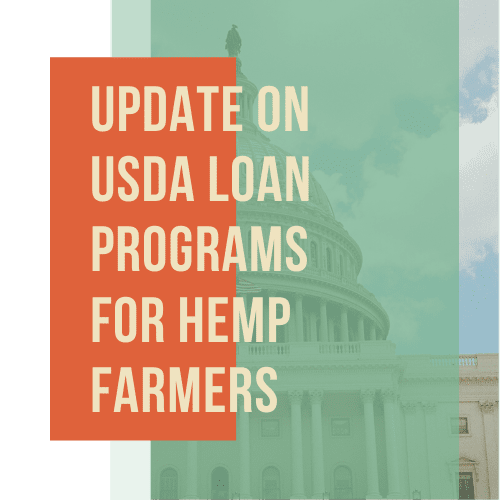INDUSTRY UPDATES
May 06, 2020
Update on USDA Loan Programs for Hemp Farmers

Earlier this week, the USDA’s Farm Service Agency (FSA) issued revised guidance on making direct and guaranteed loans to hemp producers. The revised guidance replaces earlier guidance from October 31, 2019. It is directed to the FSA’s state and county offices, which can be identified at https://www.fsa.usda.gov/state-offices/index.
In general, the revised guidance relates to servicing direct and guaranteed loans made to hemp producers. The guidance is timely because the FSA anticipates an uptick in hemp case files due to hemp now being classified as an agricultural commodity. Importantly, the revised guidance makes clear that, going forward, hemp “should be treated as closely as possible to any other agricultural commodity and serviced in the same manner.”
There are several other salient points:
- “Starting with the 2020 crop year, the FSA will be able to consider applications to grow hemp beyond the provisions of the 2014 Farm Bill.” However, to be approved, a producer must meet the requirements of the 2018 Farm Bill. Producers who continue to grow hemp under the 2014 Farm Bill remain eligible for FSA assistance.
- A loan can be serviced without a contract to grow/purchase hemp, but only if it can be shown that the applicant can cash flow without any hemp income.
- “For hemp income to be included in the projected cash flow or used within income projections, a contract is required.” There are different contract requirements for direct and guaranteed loans.
- “A lender must be able to determine that the applicant has the financial resources to repay.” This decision will be based in part on the contract to grow/purchase hemp.
- A contract to grow/purchase hemp should also:
- Provide for termination based on objective “for cause” criteria only;
- Require that the grower be notified of specific reasons for cancellation;
- Provide assurance of the producer’s opportunity to generate enough income to develop a cash flow budget and repay the loan; and
- Be issued by a purchaser that has a reasonable and realistic prospect of fulling the contract.
- Hemp exceeding acceptable THC limits must be disposed of onsite according to the USDA’s protocols.
- Existing borrowers growing hemp without a license are considered to be in non-monetary default. “Similarly, if the hemp is being grown on FSA financed real estate or FSA financed equipment and supplies are being used to produce the crop with either a direct or guaranteed loan, borrowers will also be considered in nonmonetary default.” No losses will be covered where there is a non-monetary default.
- For direct loans, realistic business plans and dependable sources of income must be shown. Whether business plans are realistic will depend on several factors, including the intended use of the hemp being produced (i.e. CBD, fiber, grain, etc.)
- Because some banking institutions do not accept financial transactions from hemp operations, “[a]pplicants should ensure the availability of a banking institution authorizing these financial transactions to ensure availability of proceeds to support payment of expenses and debts. “Additionally, producers will be required to assign their sale proceeds to FSA in an amount not to exceed their annual payment.”
- Because the 2018 Farm Bill prohibits licenses from being transferred, if a borrower defaults, dies, or abandons the hemp operation, no other person or entity may obtain the right to the hemp being produced and attempt to liquidate it.
